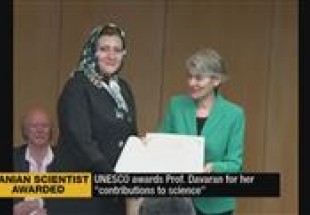
Kuisch Laroche made the remarks in a ceremony marking Iranian Women’s Day organized jointly by Sa’adabad Historical and Cultural Complex, UNESCO’s Tehran Cluster Office, and the office of the UN Resident Coordinator in the Islamic Republic of Iran.
'At UNESCO we believe that in order to be meaningful and sustainable, development must be equitable and inclusive,' she said.
'Yet, unfortunately, women around the world still face many challenges today in their socio-economic lives: There is limited participation of women in decision-making positions; segregation of women into certain activities and gender stereotypes; restricted opportunities for ongoing training, capacity-building and networking; and women also often suffer from poor employment conditions,' she added.
'Moreover, the lack of sex-disaggregated data often conceals these gender gaps and challenges from policy-makers and decision-makers,' Kuisch Laroche noted.
'Sustainability cannot possibly be achieved when half of humanity is held back. This is why UNESCO and the United Nations at large have a specific focus on the empowerment of girls and women,' she said.
'And that empowerment starts on the benches of school, with quality education and access to culture and information,' she said.
Kuisch Laroche underlined that women’s empowerment means literacy. It means access to science. It means genuine possibilities for girls to become everything they wish for and to make informed choices.
'The evidence is unequivocal: education is critical to escape chronic poverty and reduce inequalities; it is a breakthrough strategy for human development, with direct impacts on income, economic growth, the environment, health, nutrition and well-being,' she said.
She stressed that all studies have shown that educated women take better care of their families. A child born to a mother who can read and write is 50 percent more likely to survive past the age of five. This is just one figure among many that demonstrates the transformational impact of education of women and girls.
'We know that educating women is educating a whole community. Education gives voice, it encourages civic participation, and it widens opportunities on the labor market, providing skills relevant for social and economic needs,' Kuisch Laroche said.
She further remarked that education is a foundation for peacebuilding, for nurturing understanding of our shared humanity and a sense of shared responsibility for the future. And this is very important, because sustainability requires changes in how we produce and consume.
'Fundamentally, it requires new ways of seeing the world, new ways of thinking about our responsibilities to each other and the planet, new ways of acting and behaving as global citizens,' she added.
'Women empowered through education can be leading actors in this process, as they often form part of strong social networks within their communities and can play a vital role in the collective management of change,' she said.
'Therefore every woman and every man needs new skills to withstand the pressures of change and to make the most of all its opportunities,' Kuisch Laroche added.
She concluded that this is why today, as we celebrate Iranian Women’s Day, we will discuss the importance of the role of women in different aspects of life, and we would also like to pay tribute to the important achievements and contributions of Iranian women, in sciences, in culture and arts, etc. - not just to the Islamic Republic of Iran but to the entire world.

Add new comment